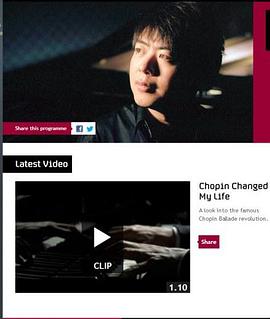更新时间:2023-12-05 20:42
详细剧情
肖邦的《G小调第一叙事曲》总长仅九分钟,诞生至今已有近二百年,却依然有着特殊的魅力,不但在视频网站上创下数百万的点击率,更影响着今天许多人的生活。本片讲述了两个普通人——苏格兰青年保罗和日本中学生桃香,在各自经历了人生的不幸之后,因肖邦的叙事曲而重新振作,勇敢面对今后的生活。伊莫金·库珀、弗拉基米尔·阿什肯纳齐、朗朗、斯蒂芬·霍夫等钢琴演奏家也将轮番登场,详细剖析这首不同寻常的钢琴曲,为我们揭开音符中的奥妙。
This hour-long documentary, directed by BAFTA and Emmy award winning director James Kent, meets Japanese teenager Momoka and Scottish music student Paul Murray to explore how Chopin’s extraordinary Ballade Number 1 transforms the lives of ordinary people and illustrates how classical music still penetrates contemporary life in unexpected and powerful ways.
Momoka, is a 15-year-old pianist from Sendai, Japan, whose community was decimated by the 2011 tsunami and earthquakes. For Momoka, the Ballade embodies the anguish and rebellion she feels but doesn't allow to surface.
For 22-year-old Paul from Glasgow, the piece is life-changing. Paul grew up in Bellshill, a working class suburb of Glasgow. He first played piano at 15, and it opened up a whole new world for him. During his first term studying on the B.Mus (Hons) degree programme at the University of Aberdeen, Paul was diagnosed with a brain tumour and then MS which both eventually caused him to lose the ability to walk and to play with his right hand. Waiting in his hospital bed in between operations over three months, he played the Ballade again and again on the iPod his dad Stephen had given him. It was that single piece's emotional pull that Paul credits with the return of his memory.
Paul told us some more about his involvement in the programme:
"I have been for some time now transcribing the Ballade in g minor for the left-hand alone. The reason being I played this piece back in high school and with the medical complications lost the ability to play perhaps my favourite piece of all time. Luckily for my this piece was going to be the subject of a major documentary and with my story and attachment to the Ballade I was selected to be involved!"
The film includes interviews with some of the world's greatest pianists including Stephen Hough, Lang Lang and Vladimir Ashkenazy. It was shown on Channel 4 in August and trailers can still be viewed on YouTube: http://www.youtube.com/watch?v=3J6KDmTE0F0 / http://youtu.be/4JM_KELsU4c
The documentary was awarded 2nd place in the 'Halo' Best Arts Documentary award category at the awards ceremony on Monday, 4 November 2013 at the Queen Elizabeth Hall at London’s Southbank Centre. The ceremony was filmed and shown on Sky Atlantic.
This hour-long documentary, directed by BAFTA and Emmy award winning director James Kent, meets Japanese teenager Momoka and Scottish music student Paul Murray to explore how Chopin’s extraordinary Ballade Number 1 transforms the lives of ordinary people and illustrates how classical music still penetrates contemporary life in unexpected and powerful ways.
Momoka, is a 15-year-old pianist from Sendai, Japan, whose community was decimated by the 2011 tsunami and earthquakes. For Momoka, the Ballade embodies the anguish and rebellion she feels but doesn't allow to surface.
For 22-year-old Paul from Glasgow, the piece is life-changing. Paul grew up in Bellshill, a working class suburb of Glasgow. He first played piano at 15, and it opened up a whole new world for him. During his first term studying on the B.Mus (Hons) degree programme at the University of Aberdeen, Paul was diagnosed with a brain tumour and then MS which both eventually caused him to lose the ability to walk and to play with his right hand. Waiting in his hospital bed in between operations over three months, he played the Ballade again and again on the iPod his dad Stephen had given him. It was that single piece's emotional pull that Paul credits with the return of his memory.
Paul told us some more about his involvement in the programme:
"I have been for some time now transcribing the Ballade in g minor for the left-hand alone. The reason being I played this piece back in high school and with the medical complications lost the ability to play perhaps my favourite piece of all time. Luckily for my this piece was going to be the subject of a major documentary and with my story and attachment to the Ballade I was selected to be involved!"
The film includes interviews with some of the world's greatest pianists including Stephen Hough, Lang Lang and Vladimir Ashkenazy. It was shown on Channel 4 in August and trailers can still be viewed on YouTube: http://www.youtube.c
The documentary was awarded 2nd place in the 'Halo' Best Arts Documentary award category at the awards ceremony on Monday, 4 November 2013 at the Queen Elizabeth Hall at London’s Southbank Centre. The ceremony was filmed and shown on Sky Atlantic.
长篇影评
1 ) 何不信仰音乐呢
来看这部纪录片,是因为 最近听到很多关于古典音乐的作品,不论是广播还是书籍📚,虽然五音不全,但不知小时侯有接触钢琴这一块,还是 音乐真的是 所有人心灵的共鸣,当你接触他,你会不由自主亲近他。
而每一个经典的古典音乐,不论时间距离,都会和有缘人产生着不一样神奇的磁场。
如果你没有信仰的话,那就信仰音乐吧,他比新闻更真实地记录了这个世界,当你迷茫、痛苦、无助、开心、兴奋时,你总能在一支曲子里听到,早在多少年以前,那些可爱的人们已经把他们的感情、智慧、经验写进了音乐里,你在这支曲子里产生的不仅仅只是共鸣,还有方向!
以前,我总爱说,all is well 什么都会好起来的,但在这个纪录片里的一句话,瞬时打动了我,肖邦的音乐让我们看到,世界就是这样的,它不会好到哪里去,但也不会坏到哪里去。就是这样一个充满着伤心、悲痛、各种不如意的世界,我们却可以活下来,很好地活下来,甚至是开心地活下去。
以前 ,qq签名里总有一句话,再牛的肖邦也弹不出我的悲伤。 哦,不 ,孩子,那你一定还没有发现这个世上有这么美好的事物—音乐。
而每一个经典的古典音乐,不论时间距离,都会和有缘人产生着不一样神奇的磁场。
如果你没有信仰的话,那就信仰音乐吧,他比新闻更真实地记录了这个世界,当你迷茫、痛苦、无助、开心、兴奋时,你总能在一支曲子里听到,早在多少年以前,那些可爱的人们已经把他们的感情、智慧、经验写进了音乐里,你在这支曲子里产生的不仅仅只是共鸣,还有方向!
以前,我总爱说,all is well 什么都会好起来的,但在这个纪录片里的一句话,瞬时打动了我,肖邦的音乐让我们看到,世界就是这样的,它不会好到哪里去,但也不会坏到哪里去。就是这样一个充满着伤心、悲痛、各种不如意的世界,我们却可以活下来,很好地活下来,甚至是开心地活下去。
以前 ,qq签名里总有一句话,再牛的肖邦也弹不出我的悲伤。 哦,不 ,孩子,那你一定还没有发现这个世上有这么美好的事物—音乐。
2 ) 我的朋友,你究竟经历了什么?
“曲子被创造出来的那一刻,便不再属于作曲者了。”
曲子被演奏家演奏,成为了一种个人的艺术诠释;被普通人聆听或弹奏,成为了生活的慰藉与困境的解药。你可以对伟大的音乐说一大堆东西,但是那是你,你说的,最终你却一点儿也不知道这个曲子对于作曲家意味着什么。
如果去查明创作背景,创作情况,创作背景,知道了在客观历史中彼刻的肖邦的心境后,发现和自己的相似,那一定是欣喜若狂。其实这种共鸣在乐曲中本来就已经达成了,不过有了客观历史的升华,会更强烈些。
那共鸣还是偏向私人和片面些吧。
200年前的历史时空,纵然有再多史书的记载,也不能完全填充那时的每一天每一分钟。如果没有逃离祖国,没有失去亲人,没有过颠沛流离的生活,没有在那个时空与他同处,怎么能完完全全的理解呢?
Of course, music is music, just enjoy it!
但是,我又但是了。但是在今时今日,没有一个人在那个年代和肖邦混过,这样也就造就了神秘性。因为谱子是公开的,曲子是可以被任何人演奏、聆听的,这就给了任何人以自己的感觉和视角去解释了,因为它神秘啊,神秘把一首伟大的曲子推到了另一个地方去了。
可是我的朋友,写出这些东西,你究竟经历了什么?
多想和肖邦同志一起颠沛流离,然后在一个稍有喘息机会的晚上,他跟我说:“嘿,这些日子我脑子里有这个旋律,你听听看。”
(我会去你的故乡看你的)
曲子被演奏家演奏,成为了一种个人的艺术诠释;被普通人聆听或弹奏,成为了生活的慰藉与困境的解药。你可以对伟大的音乐说一大堆东西,但是那是你,你说的,最终你却一点儿也不知道这个曲子对于作曲家意味着什么。
如果去查明创作背景,创作情况,创作背景,知道了在客观历史中彼刻的肖邦的心境后,发现和自己的相似,那一定是欣喜若狂。其实这种共鸣在乐曲中本来就已经达成了,不过有了客观历史的升华,会更强烈些。
那共鸣还是偏向私人和片面些吧。
200年前的历史时空,纵然有再多史书的记载,也不能完全填充那时的每一天每一分钟。如果没有逃离祖国,没有失去亲人,没有过颠沛流离的生活,没有在那个时空与他同处,怎么能完完全全的理解呢?
Of course, music is music, just enjoy it!
但是,我又但是了。但是在今时今日,没有一个人在那个年代和肖邦混过,这样也就造就了神秘性。因为谱子是公开的,曲子是可以被任何人演奏、聆听的,这就给了任何人以自己的感觉和视角去解释了,因为它神秘啊,神秘把一首伟大的曲子推到了另一个地方去了。
可是我的朋友,写出这些东西,你究竟经历了什么?
多想和肖邦同志一起颠沛流离,然后在一个稍有喘息机会的晚上,他跟我说:“嘿,这些日子我脑子里有这个旋律,你听听看。”
(我会去你的故乡看你的)
3 ) 郎朗出现很违和
看完了还不怎么相信这是BBC拍的纪录片,开头挺好,中间掉了链子,结尾演奏了整首曲子很棒。
拍摄艺术对普通人的影响,是很棒的题材,如果本片选取一个人或者一群普通人做主角,我觉得应该会比现在好,一个人的话可以深挖,一群人的话可以多几个理解角度,但是加了郎朗和阿什肯纳齐在中间做总结下结论,感觉很违和,特别是郎朗,表演性质太强了,他的理解和他的整个个人风格跟全片的基调相当不协调,这也和片名不符嘛,哪里是肖邦拯救人生。
并不是对郎朗和阿什肯纳齐有意见,而是觉得这两个人出现在这里,没有起到应有的作用,反而削弱了主题。
不过这首曲子真的好听,以前没完整听过,看完后马上去下来听。




没什么历史背景、没什么学术分析,有几位钢琴名家的见解,也有人生经历不同寻常的普通学琴者的感悟,切入角度更多像是音乐与人的关系。只是听听音乐不错的。最后有Stephen Hough的完整演绎。
昏昏欲睡
郎朗那几段对肖邦的解说,听得我尴尬症都犯了。
强行制造感动。郎朗还是适合用手弹奏,免开尊口,尬得慌。
7分,印象不深了。
直面黑暗
哭了
精华在最后九分钟的演奏中。说实话,故事的立意我非常不喜欢。
Ballade in g minor
拖沓!鸡汤
拍的方式不对
http://v.youku.com/v_show/id_XODIxNzU1NzEy.html肖邦何德何能拯救人生?钢琴还能自学?这么厉害。滑冰那段挺好看的。钢琴质量真好,这么用力弹都没坏。世界就是这样,充满黑暗恐惧和冷酷。手速好快。
保罗的故事很感人。最后完整的九分钟棒!惊现郎朗说英语!
相对比较弱,但可以看到每个人对音乐的理解原来如此一致。这种一致削弱了原著的丰富,显得枯燥无趣。
听肖邦 治肿瘤
两位主角情绪好大,作为纪录片,特别是日本女孩,非常陰気ムード。好像没改变什么
那两个故事其实都是无心插柳的收获。肖邦从来都不是单纯的美,在优雅中间他总夹杂着痛苦和分裂。然而这并不妨碍他作品中的深情和美来拯救别人
稍微意犹未尽,因为这首短小的第一叙事曲不能代表全部的肖邦吧,同样一个后天学琴的苏格兰小伙和一个看似盲眼的日本小女生的故事并不能代表被拯救了人生吧。直到四位大师演奏了本曲,还无法立即让我们记住这首名曲,我再去多听几遍吧,反正也不长。
想起以前大一大二的时候,整夜整夜地失眠,就听肖邦。那时我正处于感情困惑中,我感觉肖邦实在是,他的感情的真诚、深度与高度,已经到达了人类的尽头(因此他的音乐有着极强的愈疗能力)。再难找出另一个拥有像他那样感情深度的人了。
我原来一直没觉得肖邦的第一叙事曲有多好听,直到昨天。这和拉二的经历好像。事实证明,听不进去的曲子不用勉强,等一等就好了。